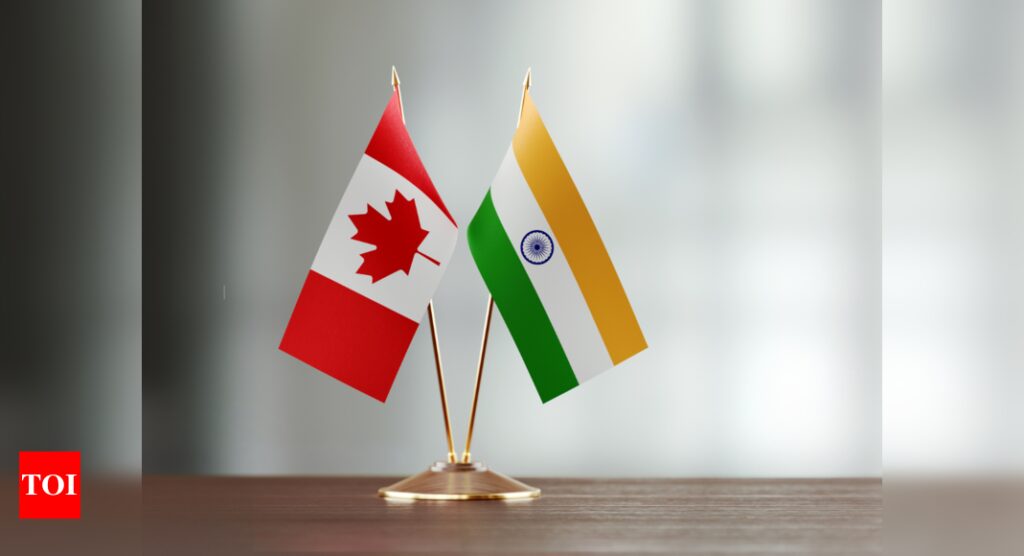[ad_1]
NEW DELHI: The Indian Army on Wednesday said tensions in India-Canada relations “don’t impact us” and that India’s “diplomatic approach, military records with Canada continue”.
While addressing the curtain raiser event on the scheduled Indo-Pacific Army Chiefs conference, Indian Army’s Additional Director General (Strategic Planning) Major General Abhinaya Rai said Canada’s military delegation was coming for the conference.
” The Canadian chief is coming here. His delegation is coming here. When we look at the relationship with some neighbours of ours, where we may have had a standoff but we continue to engage them at all levels…I am directly referring to China here. Our diplomatic efforts as also the military efforts with even Canada continue to be there” said Major General Rai.
At the Indo-Pacific Armies Chiefs Conference to be held at Manekshaw Centre, Delhi Cantonment from September 26-27 the Canadian Army will be represented by its deputy commander Major General Peter Scott.
The conference that is being held to ascertain multilateral security partnerships in the region, takes place regularly to thrash out differences, build trust and better communication among professional armies for a free and open Indo-Pacific.
Chief-of-Staff of the US Army, General James C McConville, along with his delegation, will also be present for the three events that he will co-host along with Chief of Indian Army Staff General Manoj Pande.
Indo-Canadian relations dipped after Canadian PM Justin Trudeau on Monday alleged that the Indian government was behind the fatal shooting of Hardeep Singh Nijjar a designated terrorist in India. The allegations were rejected by India’s Ministry of External Affairs (MEA) which dubbed them ‘absurd ‘and ‘motivated’.
Signalling a further souring of bilateral ties, Canadian Foreign Minister Melanie Joly then said that an Indian diplomat in the country had been expelled from Canada.
This was followed by a reciprocal move from India on Tuesday with the expulsion of a senior Canadian diplomat who was given 5 days to leave the country.
After coming under severe pressure the Canadian Prime Minister appeared to tone down the rhetoric on Tuesday saying Canada was not looking to provoke India.
“We are not looking to provoke or escalate, we want to work with the government of India to lay everything clear and to ensure there are proper processes” Trudeau said in a news briefing.
Khalistan Tiger Force chief Hardeep Singh Nijjar who was a designated terrorist in India, was gunned down outside a Gurdwara, in a parking area in Canada’s Surrey, British Columbia on June 18.
While addressing the curtain raiser event on the scheduled Indo-Pacific Army Chiefs conference, Indian Army’s Additional Director General (Strategic Planning) Major General Abhinaya Rai said Canada’s military delegation was coming for the conference.
” The Canadian chief is coming here. His delegation is coming here. When we look at the relationship with some neighbours of ours, where we may have had a standoff but we continue to engage them at all levels…I am directly referring to China here. Our diplomatic efforts as also the military efforts with even Canada continue to be there” said Major General Rai.
At the Indo-Pacific Armies Chiefs Conference to be held at Manekshaw Centre, Delhi Cantonment from September 26-27 the Canadian Army will be represented by its deputy commander Major General Peter Scott.
The conference that is being held to ascertain multilateral security partnerships in the region, takes place regularly to thrash out differences, build trust and better communication among professional armies for a free and open Indo-Pacific.
Chief-of-Staff of the US Army, General James C McConville, along with his delegation, will also be present for the three events that he will co-host along with Chief of Indian Army Staff General Manoj Pande.
Indo-Canadian relations dipped after Canadian PM Justin Trudeau on Monday alleged that the Indian government was behind the fatal shooting of Hardeep Singh Nijjar a designated terrorist in India. The allegations were rejected by India’s Ministry of External Affairs (MEA) which dubbed them ‘absurd ‘and ‘motivated’.
Signalling a further souring of bilateral ties, Canadian Foreign Minister Melanie Joly then said that an Indian diplomat in the country had been expelled from Canada.
This was followed by a reciprocal move from India on Tuesday with the expulsion of a senior Canadian diplomat who was given 5 days to leave the country.
After coming under severe pressure the Canadian Prime Minister appeared to tone down the rhetoric on Tuesday saying Canada was not looking to provoke India.
“We are not looking to provoke or escalate, we want to work with the government of India to lay everything clear and to ensure there are proper processes” Trudeau said in a news briefing.
Khalistan Tiger Force chief Hardeep Singh Nijjar who was a designated terrorist in India, was gunned down outside a Gurdwara, in a parking area in Canada’s Surrey, British Columbia on June 18.
[ad_2]
Source link











More Stories
Congress replaces Kamal Nath, names an OBC as Madhya Pradesh chief | India News
Fire breaks out in ITBP camp in Srinagar; none hurt | India News
Parliament Security: Co-villagers give clean chit to Lalit Jha, parents to move court | India News